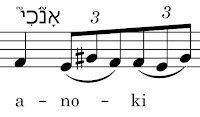The more I work with my tables, the higher my confidence that I have found all my errors. So I will now look at the reciting notes, merkha and d'khi / tifha that rarely host ornaments.
My statistics (updated yet again) all assume the default mode. In the 21 books, f (merkha) is often immediately followed by g#. merkha occurs in 88% of the verses of the 21 books, but in most of them (80%) it is immediately followed by g#. That confines the verses for recitation on f to 3,829 verses out of 18,720 in the 21 books.
We already have encountered one such verse in the table of rarely used accent,
tarsin. I have called on the verse from 2 Samuel 19 again for this
merkha-tifha table.
Another verse, Deuteronomy 5:7 briefly uses an accent while the recitation is
on f in a very complex fashion.
| 7 ♪B Not it is for you: other gods over my presence. | |||
| ז ל֣א יהי֥ה לך֛֩ אלה֥֨ים אחר֖֜ים על־פנֽ֗י | 15 |
z la ihih lç alohim akrim yl-pnii | |
Here you see three syllables each containing two accents. I know there are other explanations for this feature, but it occurs in other places than the decalogue and the deciphering key handles multiple accents on a word or syllable just fine.
And I chose at random a verse from Jeremiah out of the thousands. He uses merkha, reciting note f, to great
effect for his 'woe is me' verse.
|
19 ♪f Woe to me over my
brokenness. My defeat is ill. And I, I said, Surely this is my illness, and I must bear it. |
|||
|
יט א֥וי לי֙
על־שבר֔י
נחל֖ה
מכת֑י ואנ֣י אמ֔רתי א֛ך ז֥ה חל֖י ואשאֽנו |
11 15 |
iT aoi li yl-wbri nklh mcti vani amrti aç zh koli vawanu |
|
 |
| from 2 Samuel 3:8 |
I think I can see why the training in this music would occupy several years as Suzanne Haïk-Vantoura writes.
 |
| merkha Tifha table for the 21 books selections from 2 Samuel 19:12, Deuteronomy 5:7, Jeremiah 10:19, 2 Chronicles 20:12 Joshua 17:2, Deuteronomy 5:12 |

No comments:
Post a Comment